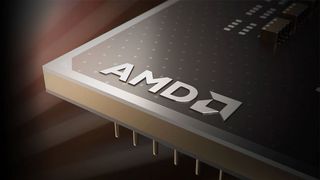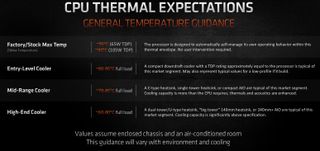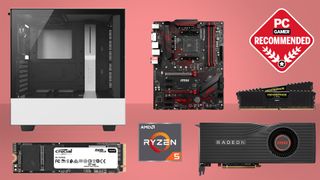AMD views Ryzen 5000 CPU temperatures up to 95C as ‘typical and by design’
Higher temps mean Zen 3 can boost higher and longer.

AMD is not freaking out over its latest generation Zen 3 processors hitting higher temperatures than what users might be accustomed to, or comfortable with, based on temp characteristics of prior generation CPUs. In certain instances, a Ryzen 5000 series CPU may run at 90C or even 95C, which is "typical and by design," according to AMD.
That said, if your idle temps are in the 90C range, or even close to that point, you have a cooling problem—maybe you forgot to apply thermal paste or have your home's thermostat set to 9th Circle of Hell. But at full load? It's just another day at the beach for Zen 3.
In a Reddit post (via HardwareTimes), a user posted an exchange they had with Robert Hallock, director of technical marketing at AMD, about CPU temps as they related to the Ryzen 5000 series. The post is several weeks old and managed to go under our radar until now, but is still relevant and interesting (especially since the bigger focus right now is actually finding a Ryzen 5000 CPU in stock).
The user asked Hallock if "we have to change our understanding of what is 'good' and 'desirable' when it comes to CPU temps for Zen 3." In short, the answer is yes, sort of. But Hallock provided a longer answer, explaining that 90C is normal a Ryzen 9 5950X (16C/32T, up to 4.9GHz), Ryzen 9 5900X (12C/24T, up to 4.8GHz), and Ryzen 7 5800X (8C/16T, up to 4.7GHz) at full load, and 95C is normal for the Ryzen 5 5600X (6C/12T, up to 4.6GHz) when spinning its wheels as fast as they will go.
"Yes. I want to be clear with everyone that AMD views temps up to 90C (5800X/5900X/5950X) and 95C (5600X) as typical and by design for full load conditions. Having a higher maximum temperature supported by the silicon and firmware allows the CPU to pursue higher and longer boost performance before the algorithm pulls back for thermal reasons," Hallock said.
"Is it the same as Zen 2 or our competitor? No. But that doesn't mean something is 'wrong.' These parts are running exactly as-designed, producing the performance results we intend," Hallock continued.
AMD has been forthcoming about this, even if the temperature profiles of Ryzen 5000 CPUs have not received a ton of attention. The same temps are mentioned in one of AMD's slides. Have a look:
PC Gamer Newsletter
Sign up to get the best content of the week, and great gaming deals, as picked by the editors.


Best CPU for gaming: the top chips from Intel and AMD
Best graphics card: your perfect pixel-pusher awaits
Best SSD for gaming: get into the game ahead of the rest
AMD breaks it down by cooler type. Note that of the Ryzen 5000 CPUs that have been released so far, only the Ryzen 5 5600X comes with a stock cooling solution. If you venture out on your own and pick up an "entry level cooler"—one with a TDP rating that is about the same as your CPU—you could see temps of around 80-95C at full load. And with some all-in-one liquid coolers, hitting 85C would be normal in AMD's eyes.
"No user intervention required," AMD's slide says of these situations.
None of this means you will necessarily witness temps spike to 90C or above. When we evaluated the Ryzen 9 5900, we found "nothing alarming to report" in regards to temps—it peaked at 81C, which is comparable with the Ryzen 9 3900XT.
It is definitely something to be aware of, though, if building a PC around a Ryzen 5000 series CPU (and getting lucky enough to actually find one for purchase).
Paul has been playing PC games and raking his knuckles on computer hardware since the Commodore 64. He does not have any tattoos, but thinks it would be cool to get one that reads LOAD"*",8,1. In his off time, he rides motorcycles and wrestles alligators (only one of those is true).
Most Popular








